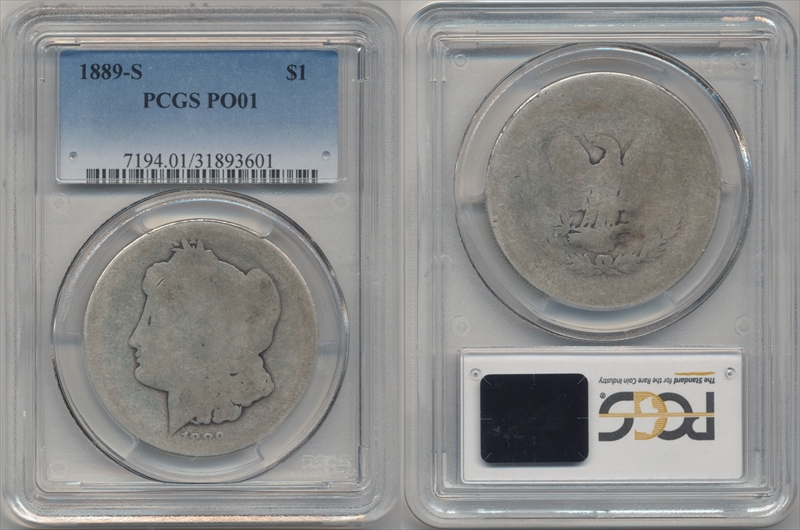1889-S $1 PO1 认证号31893601, PCGS号7194
专家评论
Q. David Bowers
The following narrative, with minor editing, is from my "Silver Dollars & Trade Dollars of the United States: A Complete Encyclopedia" (Wolfeboro, NH: Bowers and Merena Galleries, Inc., 1993)Numismatic Information
Once the rarest Morgan dollar: Until at least the mid-1920s, the 1889-S was considered to be the rarest of all Morgan dollars, outranking such issues as the 1889-CC, 1892-S, 1893-S, and 1895. Most old-time collections lacked an example in any grade.
At the P.H. Griffith Collection Sale conducted by B.Max Mehl on March 20, 1912, an 1889-S in just Fine fetched $3.10, as compared to $2.25 for a Proof 1895 dollar. At the United States Coin Company sale of a "Collection of Coins Belonging to a Prominent American," May 19-21, 1915, an Uncirculated 1889-S soared to $19.00, and was by far the most expensive Morgan dollar in the sale (by comparison, an Uncirculated 1892-S brought $l.50, an 1893-S in similar grade fetched $4.00, a glittering Proof 1895 sold for $1.50, and a Mint State 1895-0 brought $1.75; this group of four key issues selling in total for less than half of the 1889-S price!). The sale of the William Forrester Dunham Collection in 1941, one of the greatest cabinets ever to be sold, lacked an 1889-S in any grade.
As the rarity of the 1889-S was neither publicized nor known, historical price data are very erratic. Today, however, the glory that was 1889-S has faded, and little attention is paid to the issue. Until the research was done for the present work, I, like everyone else, did not know of the former lofty status of this interesting variety. Not a whisper of its erstwhile rarity appears in any text I have ever read on the series.
Hoard coins: At the time of minting, nearly all 1889-S dollars went into storage, mostly at the San Francisco Mint. As noted, it was considered to be a great rarity for many years. Finally, a few bags broke on the market in 1937, and many in the early 1940s, after which the 1889-S became common. During the early 1950s, quantities were available for face value at the San Francisco Mint. The sum of these releases is not known, but I imagine that somewhere on the order of 50,000 to 100,000 coins went into the hands of dealers, investors, collectors, casino owners, and others who saved them.
Today in the 1990s, the 1889-S, with its relatively low mintage, is one of the scarcer San Francisco Morgan dollars in Mint State, although it is hardly rare. The Redfield hoard (1976) is said to have contained several thousand Mint State coins, most of which were heavily bagmarked.
Circulated grades: 1889-S dollars are scarce in worn grades. I estimate that 25,000 to 50,000 survive, which for a Morgan dollar is not many. In 1925, numismatist E.S. Thresher reported that despite searching since 1919, he had not been able to find an example in circulation; one of just eight coins absent from his Morgan dollar collection (the others were 1884-CC, 1885-CC, 1892, 1893-5, 1894, 1897, and 1899). Most worn pieces represent those circulated since about the 1930s. Thus, they are apt to be in higher grade levels such as EF and AU.
Mint State grades: The 1889-S dollar is readily available in Mint State. Most are MS-60 to 62, atwhich division I believe that about 35,000 to 55,000survive. The estimate decreases to 12,000 to 20,000for MS-63 coins, 6,000 to 10,000 for MS-64s, and only 1,200 to 2,000 for MS-65s, the latter being rare(within the context of the series).
Prooflike coins: Semi-prooflike coins are plentiful, and probably thousands exist. Wayne Miller noted that the Redfield estate had a "large quantity" of these. Some one-sided (obverse) DMPL coins survive. Cameo DMPL coins with mirror surface on both sides are rare. As of September 1992, NGC and PCGS certified 42 DMPL coins, nearly all in lower grade levels.
Varieties
Business strikes:
1. Normal date: Breen-5609. High 9. A glance at the VAM plates indicates that on many of the 11 varieties the 1 in the date is closer to the denticles than the 9. From five pairs of dies received at the San Francisco Mint on December 11, 1888. Others may have been shipped later, to languish in the vaults.
Dies prepared: Obverse: 5; Reverse: 5.
Business strike mintage: 700,000; Delivery figures by month: January-October: none; November: 200,000; December: 500,000.
Estimated quantity melted: Probably over 100,000 under the 1918 Pittman Act and subsequent legislation.
Availability of prooflike coins: Semi-prooflike pieces come on the market fairly often. DMPL cameos are rare and are nearly all below MS-65.
Characteristics of striking: Usually sharp.
Known hoards of Mint State coins: Multiple bags were distributed from the San Francisco Mint in 1937. Other bags were released in the 1950s and 1960s. The Redfield hoard (1976) had an estimated 3 to 5 bags (from these earlier releases).
Commentary
Few people today know that in the early twentieth century the 1889-S was considered to be the greatest of all rarities in the Morgan dollar series.
PCGS #
7194
设计师
George T. Morgan
边缘
Reeded
直径
38.10 毫米
重量
26.73 克
铸币数量
700000
金属成分
90% Silver, 10% Copper
更高评级数量
12846
评级较低的钱币数量
0
地区
The United States of America
价格指南
PCGS 数量报告
拍卖 - PCGS 评级的
拍卖 - NGC 评级的
稀有性和存量估计 了解更多
| 所有评级 | 70000 |
| 60或以上 | 50000 |
| 65或以上 | 2400 |
| 所有评级 | R-2.3 |
| 60或以上 | R-2.5 |
| 65或以上 | R-4.5 |
| 所有评级 | 28 / 117 TIE |
| 60或以上 | 49 / 117 TIE |
| 65或以上 | 65 / 117 TIE |
| 所有评级 | 28 / 117 TIE |
| 60或以上 | 49 / 117 TIE |
| 65或以上 | 65 / 117 TIE |























